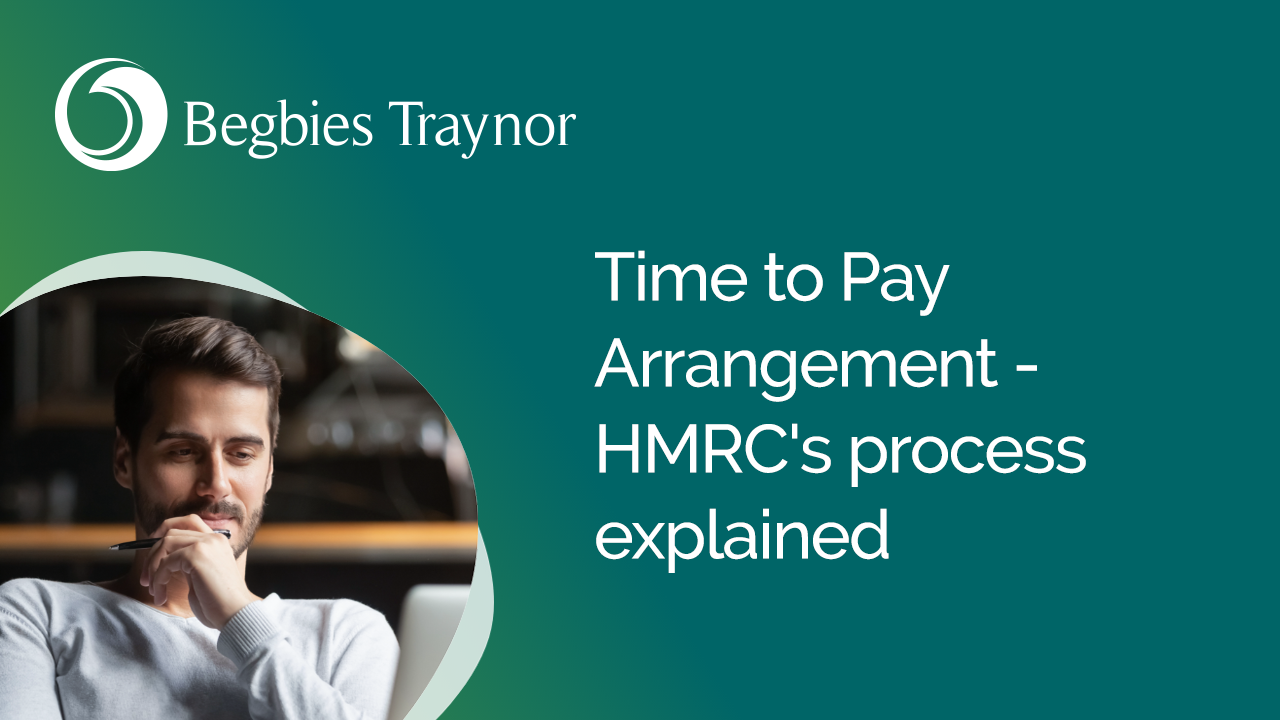
A Time To Pay arrangement is a way of repaying your company tax arrears over a longer period of time to make doing so more affordable.
In order to enter into a Time to Pay arrangement, an agreement must first be reached between the indebted company and HMRC where it will be set out how much the company is committing to pay and over what period of time. You cannot typically have a Time to Pay arrangement longer than one year in duration.
Time To Pay is a common solution for UK businesses struggling to meet tax liabilities, however, not every company will be able to successfully negotiate this type of arrangement. With a Time to Pay arrangement, no debt will be written off, therefore you must be able to demonstrate your ability to repay the full amount of your tax arrears (and continuing tax liabilities) within a period typically not exceeding 12 months.

Time to Pay (TTP) arrangements are designed to help businesses that are fundamentally viable but experiencing temporary cash flow problems.
If HMRC believes that your company is at risk of becoming insolvent, they may act quickly to recover their money, so we must stress that a Time to Pay arrangement is only for those businesses which are fundamentally viable and are able to fully repay their tax arrears within a year.
When dealing with tax arrears, you are advised to be proactive with HMRC about the situation. Do not wait to be contacted by them because your tax payment was late, instead make them aware ahead of time that you are experiencing cash flow issues. You are much more likely to be able to negotiate a Time to Pay arrangement if you maintain good relations with HMRC and are able to demonstrate a good track record of meeting your tax obligations.
Time to Pay arrangements can be implemented for arrears of corporation tax, VAT and PAYE, but can also be used if you are anticipating problems with an upcoming payment or payments, and it may help you to avoid a late payment penalty.
Before agreeing to a Time to Pay, HMRC will want to satisfy themselves that your company will be able to bring your tax affairs up to date in a timely manner and that the business is ultimately viable; as part of this they may consider the industry in which you operate along with your company's previous history of repayment as a whole.
If a Time To Pay arrangement is agreed, it is imperative that you meet these payments in full and on time, otherwise your problems could increase. HMRC could immediately cancel the arrangement if you default, calling in the total debt and applying a range of penalties.
Interest will typically be charged on the amount to be paid as part of the Time to Pay arrangement, but penalties may be lifted if you have made contact with HMRC quickly, and acted responsibly to redress your situation.
Once you have put together a strong case in favour of being granted extra time to pay, you need to phone HMRC, or seek the help of a licensed insolvency practitioner who will negotiate on your behalf.
But what constitutes a ‘strong’ case? This means presenting a realistic proposal in terms of what you can afford to pay, backed up by evidence in the form of:
It is worth remembering that HMRC will want the Time To Pay arrangement to be over the shortest time possible, with the highest monthly repayments as possible, in order to recoup their money quickly. You must be careful, however, to offer only what you can afford, and be certain that your company can meet its obligations as set out in the plan before presenting this to HMRC.
Dealing with HMRC can be daunting unless you understand how they operate and what they are looking for in terms of a Time to Pay proposal; this is why many of our clients ask us to negotiate with HMRC on their behalf.
HMRC will expect you to provide strong supporting evidence that the payments you are proposing are large enough to satisfy HMRC, but small enough that they are affordable for your company. If HMRC take the view that the sums are unsustainable given your business’ financial situation they may refuse to grant any additional time to pay.
Alternatively, HMRC may demand a higher monthly repayment than the amount you are offering and if you are unable to do this, your Time to Pay application will be refused.
If a Time To Pay is rejected as HMRC believes your company is close to insolvency, they may decide to enforce the debt via enforcement action or even a winding up petition. A winding up order would result in the business being forcibly liquidated.
The fact that late payers are spotted quickly by HMRC makes it all the more important to contact them as soon as you know there is a problem. Not only will this strengthen your case in favour of a Time to Pay arrangement, it will help the company’s financial position as late payment penalties will be avoided.
Begbies Traynor offers a free initial consultation if you want to find out more about Time to Pay arrangements. We can enter into negotiations with HMRC on your behalf, or offer professional advice on how to present your case.
More Begbies Traynor Articles
Contact Begbies Traynor Group

You're in Safe Hands
Article Archive
Article Categories